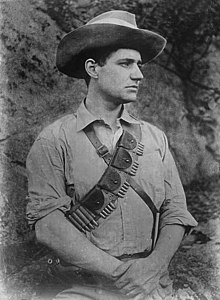Fritz Duquesne | |
|---|---|
 Captain Duquesne, Boer Army picture, c. 1900 | |
| Birth name | Frederick Joubert Duquesne |
| Nickname(s) | The man who killed Kitchener;[1] The Black Panther;[2]The Duke[3] Aliases (c. 30 known):[4] Captain Claude Stoughton;[5] Frederick Fredericks;[6] Boris Zakrevsky (assumed the identity of the real-life Russian Duke);[7] Major Frederick Craven;[8] George Fordham;[9] Piet Niacud;[9] Colonel Beza |
| Born | 21 September 1877 East London, Cape Colony |
| Died | 24 May 1956 (aged 78) New York City, U.S. |
| Allegiance | South African Republic German Empire Nazi Germany |
| Service | primarily Espionage |
| Years of service | 1899–1901 (Boer) 1901 (British) c. 1913–1942 (German) |
| Rank | Captain (Boer Army; South Africa)[10] Lieutenant (Britain; infiltrator) [11] Colonel (Germany)[12] |
| Commands | Duquesne Spy Ring[13] |
| Battles / wars | Second Boer War: — Siege of Ladysmith — Battle of Colenso — Battle of Bergendal — Plot to sabotage Cape Town[2] World War I — Espionage in United States[14][15] — Sinking of 22 British merchant ships in South America,[16] including: the Tennyson,[14] the Salvador,[14] and the Pembrokeshire[14] — Sinking of HMS Hampshire (disputed)[17][18] — Assassination of Lord Kitchener (disputed)[17][18] World War II — Espionage in United States[13] |
| Awards | Iron Cross, 1916 (disputed)[17][18] |
| Other work | commando; war correspondent; journalist; con man |
Frederick "Fritz" Joubert Duquesne (/djuːˈkeɪn/ dew-KAYN; sometimes Du Quesne; 21 September 1877 – 24 May 1956) was a South African Boer and German soldier, big-game hunter, journalist, and spy. Many of the claims Duquesne made about himself are in dispute; over his lifetime he used multiple identities, reinvented his past at will, claimed family ties to aristocratic clans and famous people and even asserted the right to military titles and medals with no third-party verification.[n 1]
Duquesne fought on the side of the Boers in the Second Boer War and as a secret agent for Germany during both World Wars. He gathered human intelligence, led spy rings and carried out sabotage missions as a covert field asset in South Africa, the United Kingdom, Central and South America, and the United States. Duquesne went by many aliases, fictionalized his identity and background on multiple occasions, and operated as a con man. As a Boer spy he was known as the "Black Panther", in World War II he operated under the code name DUNN, and in FBI files he is frequently referred to as "The Duke". He was captured, convicted, and escaped several prisons.
During the Second Boer War, Duquesne was captured and imprisoned three times by the British and once by the Portuguese, and each time he escaped. On one occasion he infiltrated the British Army, became an officer and led an attempt to sabotage Cape Town and to assassinate the commander-in-chief of the British forces, Lord Kitchener. His team was given up by an informant and all were captured and sentenced to death. He later became known as "the man who killed Kitchener" since he claimed to have guided a German U-boat to sink HMS Hampshire on which Lord Kitchener was en route to Russia in 1916, although forensics of the ship do not support this claim.
After a failed attempt to escape prison in Cape Town, Duquesne was sent to prison in Bermuda, but he escaped to the US and became an American citizen. In World War I, he became a spy and ring leader for Imperial Germany, sabotaging and destroying British merchant ships in South America with concealed bombs. After he was caught by federal agents in New York in 1917, Duquesne feigned paralysis for two years and cut the bars of his cell to make his escape, thereby avoiding deportation to Britain where he faced murder charges for the deaths of British sailors.
In 1932, Duquesne was again captured in New York by federal agents and charged with both homicide and for being an escaped prisoner, only this time he was set free after the British authorities declined to pursue his wartime crimes. The last time Duquesne was captured and imprisoned was in 1941, when he and thirty-two other members of the Duquesne Spy Ring working for Nazi Germany were caught by William G. Sebold, a double agent with the FBI who half-pretended to be spying for the Germans. Duquesne was later convicted in the largest espionage conviction in American history.
Between wars, Duquesne served as an adviser on big-game hunting to US President Theodore Roosevelt, as a publicist in the movie business, as a journalist, as a fictional Australian war hero and as head of the New Food Society in New York. During the Second Boer War he had been under orders to kill Frederick Russell Burnham, Chief of Scouts in the British Army, but in 1910 he worked with both Burnham and then Rep. Robert Broussard to lobby the United States Congress to fund the importation of hippopotamuses into the Louisiana bayous to solve a severe meat shortage.
- ^ a b Wood 1932.
- ^ a b Burnham 1944, p. 11.
- ^ Duffy 2014, p. 154,156,188,205.
- ^ a b Evans 2014.
- ^ Tunney 1919, p. 217.
- ^ Ronnie 1995, p. 138.
- ^ Ronnie 1995, p. 141.
- ^ Quigley 1999, pp. 30–31.
- ^ a b Tunney 1919, pp. 236–38.
- ^ Ronnie 1995, p. 18.
- ^ Ronnie 1995, p. 20.
- ^ Duffy 2014, p. 153.
- ^ a b FBI 2013.
- ^ a b c d Current History 1920, p. 405.
- ^ West 1932, p. 33.
- ^ Reprobate 2013.
- ^ a b c Wood 1932, p. 312-323.
- ^ a b c Ronnie 1995, pp. 349–350.
- ^ Mooallem 2013.
Cite error: There are <ref group=n> tags on this page, but the references will not show without a {{reflist|group=n}} template (see the help page).